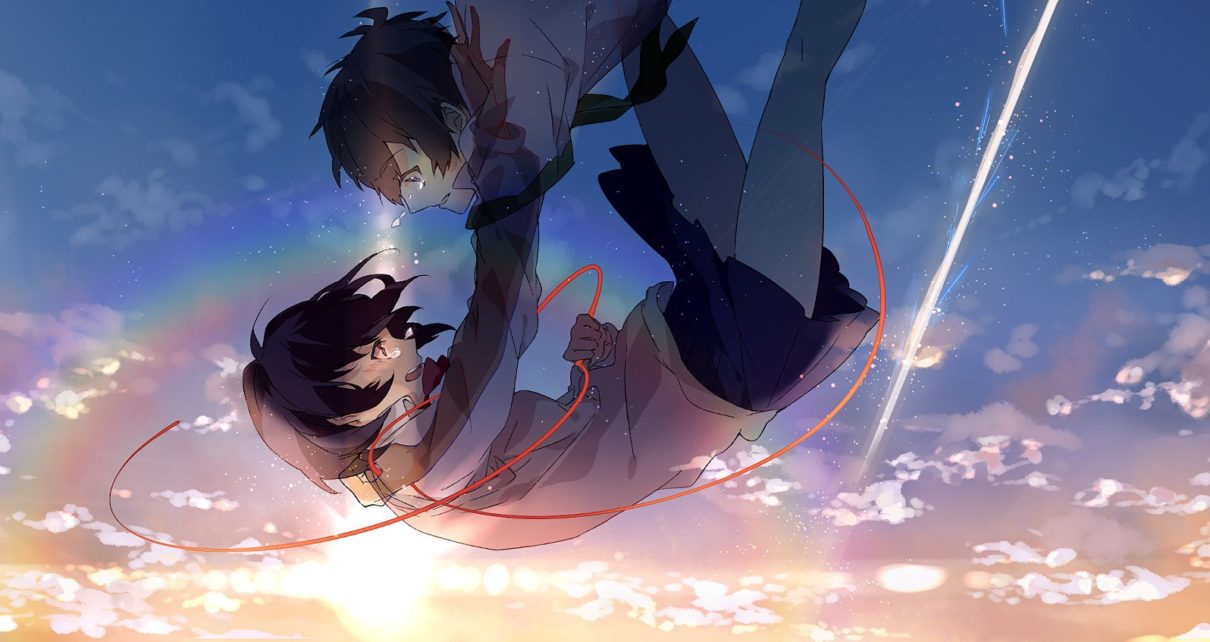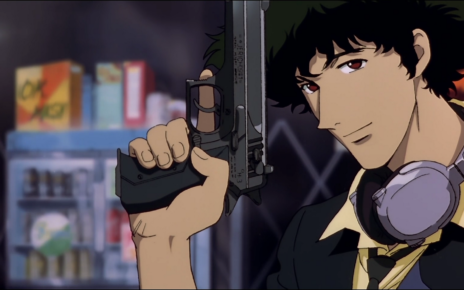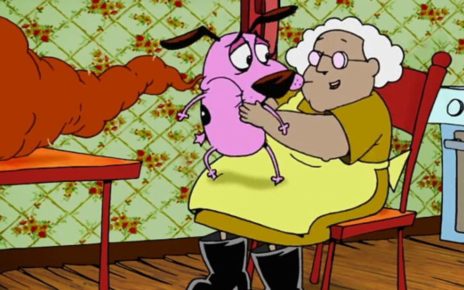We all think it at some point, especially when we’re young. Someone steps into your train car and looks at you. They look right at you—in the eyes. You entertain the notion for a few seconds, probably not even that long, that they understand you a little better than anyone else does. Then you let the thought go, like wisps of a dream you already can’t remember even minutes after you wake, and never revisit again until something jogs your memory years later.
This is the crux of Your Name. (period included, please), the hands-down prettiest film of 2016 and the highest-grossing anime movie of all time, having dethroned Hayao Miyazaki’s box office juggernaut Spirited Away. Your Name.’s success comes in spite of its weirdness. It’s a teen romance that body-swaps its leads as much as Freaky Friday did. It’s a critique of both urban and provincial life that relishes in unabashedly trippy metaphysics. It’s a photorealistic depiction of nature, technology, and infrastructure that holds its focus even as its plot unravels into high fantasy.
Your Name. has moved Japanese and international audiences alike, and with it finally theaters in the United States, it’s time to talk about it.

Meet Taki and Mitsuha. They swap bodies.
At the start of the film, Your Name.’s leads couldn’t be more removed from each other. Taki lives in the city, and Mitsuha lives in the country. Taki’s a boy, and Mitsuha’s a girl. Taki works as a waiter at a tony Italian restaurant, and Mitsuha works with her sister and grandmother at their Shinto shrine. Like every protagonist of every teen film ever made, neither of them are happy. The action kicks in when the pair begins to swap bodies.
The trick Your Name. pulls is that its much-vaunted body-swapping device does matter—but like, barely. Adolescents separated by time and space are a pet obsession of Shinkai’s, and he’s always treated their emotions with grace. His first professional project, Voices of a Distant Star, divided two young lovers across the solar system as they send each other text messages that take increasingly longer and longer to reach the other recipient. Your Name.’s play is similar, shifting a James Cameron–sized Titanic’s worth of emotion and memory into the digital notes Taki and Mitsuha leave each other every time they swap bodies. It’s played for laughs at first—Shinkai can’t resist the comedy of both of them touching their unfamiliar body parts, for instance—but the movie never trivializes their emotions or condescends to its audience. It bends over backwards to establish their agreement on ground rules because the film takes their maturity as a given. That’s important because…
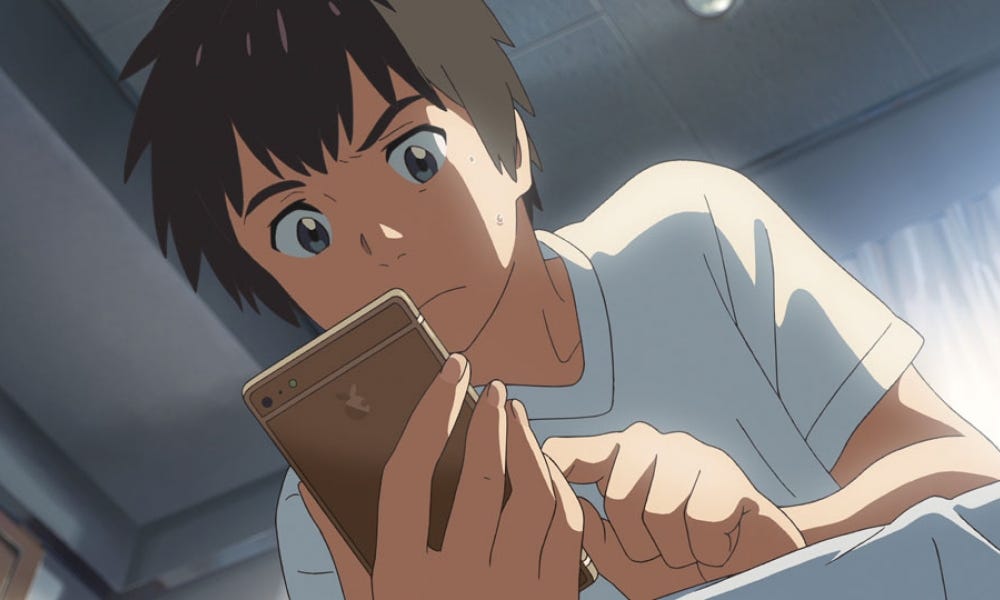
Body-swapping isn’t the film’s only device.
Taki and Mitsuha don’t eventually come to understand and empathize with each other just because they swap bodies. Smartphones, public transportation, twilight, a sake ritual, and a giant comet arcing across the sky are just a few of the elements that tether the two of them to each other. Each of these carries its symbolism and urgency in the plot, but smartphones and public transit arguably share the most in common with the shared experiences of American audiences. Taki rides trains every day for years and years, surrounded by city commuters who don’t speak and who hardly have faces. At one point, Mitsuha takes the train into Tokyo from her verdant remote town only to find sadness and feel horribly gaslighted. In the screens of their phones, Taki and Mitsuha escape the pressures around them through the notes they pass each other, growing so attached that when they stop swapping bodies, the plot takes a cataclysmic turn.
If you liked this story, sign up for our newsletter.
If none of that sounds familiar, you’ve never ridden public transit or experienced someone you like ghost on you in the middle of text conversation. Your Name.’s commentary on the pain of that deprivation—which hurts a lot more when you’re young—might be its most human thesis.
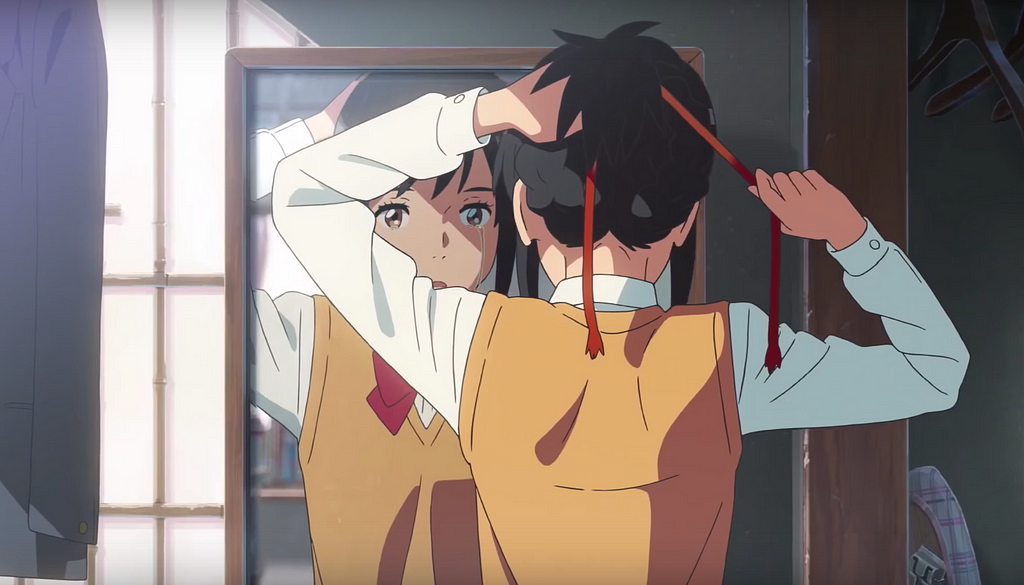
This is why Mitsuha’s red ribbon is so important.
Despite that pain, Mitsuha and Taki are tied by to each other — both literally and figuratively. To those familiar with Japanese and Chinese folklore, Mitsuha’s red ribbon is quite obviously a nod to “The Red String of Fate,” an important concept that appears in anime and other East Asian cultural products ranging from Sailor Moon to Attack on Titan. The red string connects two souls who can never be separated, no matter what obstacles time, place, or circumstance put in their way. Per the legend: “The red string might get tangled, contracted or stretched, as surely often happens, but it can never break.”
Mitsuha’s red ribbon quite literally ties the film together, from the opening song to the finale. It’s arguably Your Name’s single most important visual motif, blending and morphing into the arcing light of the comet at the center of the film’s plot and also recurring in scenes with Mitsuha’s spiritually-attuned grandmother. That’s the context Japanese teens brought to the movie’s plot that American audiences didn’t grow up with, and it offers a blind, stupid, awesome, exuberant, idiotic hope that Taki and Mitsuha will reconnect. It’s stupendously youthful, and it totally works.
Somehow—even as all these discrete elements collide into an unabashedly J-pop soundtrack and race toward a frenetic, cataclysmic finale—Your Name. doesn’t buckle under the weight of its own flourishes. Instead, just like Taki’s climactic note to Mitsuha at the end of Your Name, the film focuses only on its emotions, because those matter the most.
I wouldn’t dream of spoiling the ending for anyone. Like any young relationship, it’s best left a surprise.
Thanks for reading The Dot and Line, where we talk about animation of all kinds. Feel free to follow us on Twitter and Facebook.


